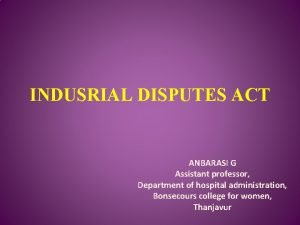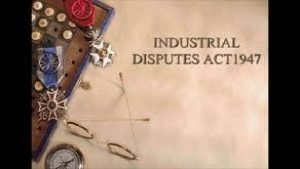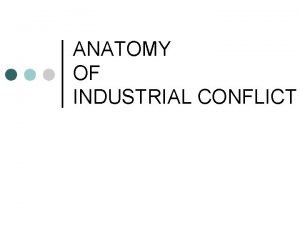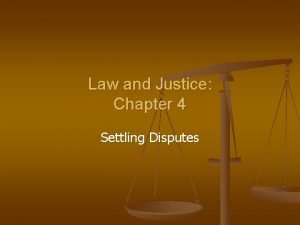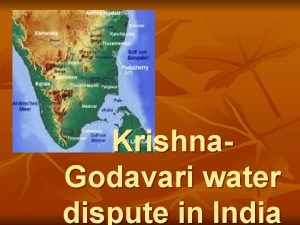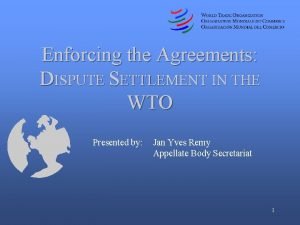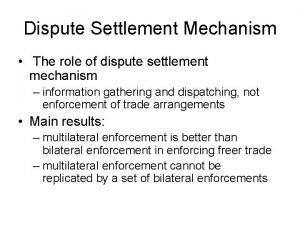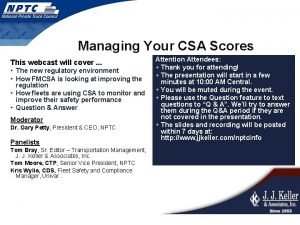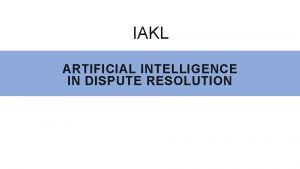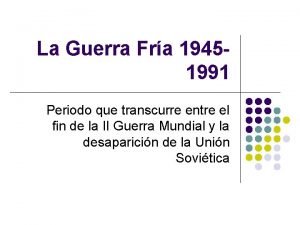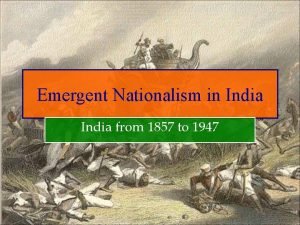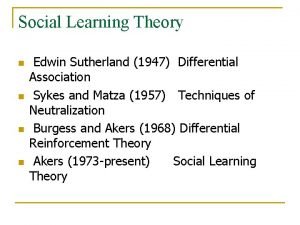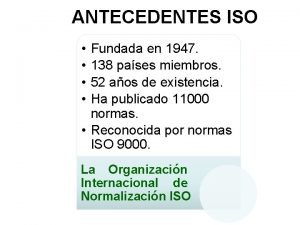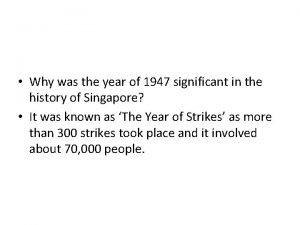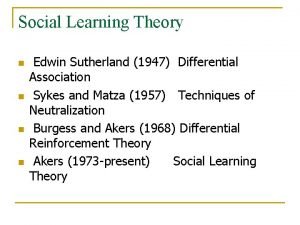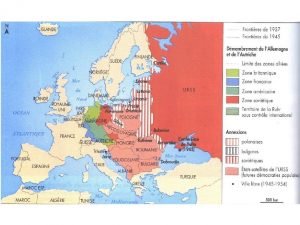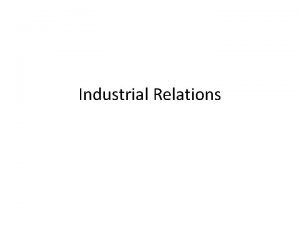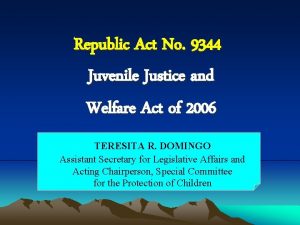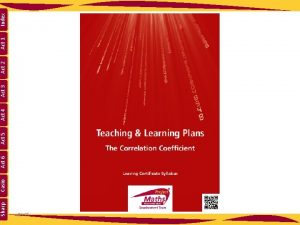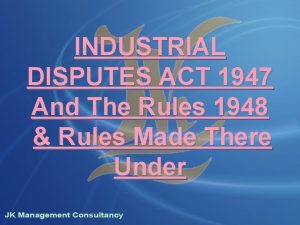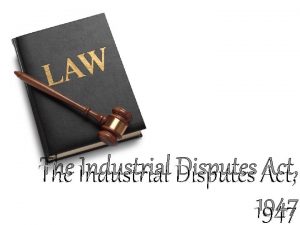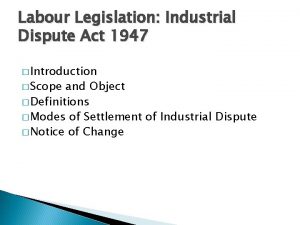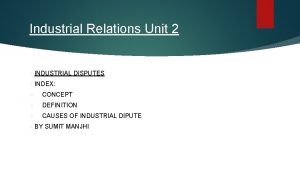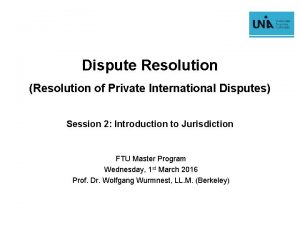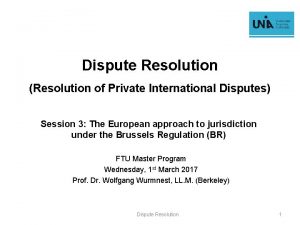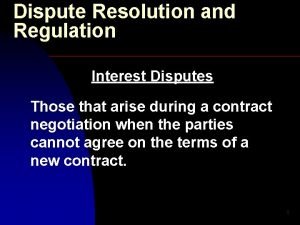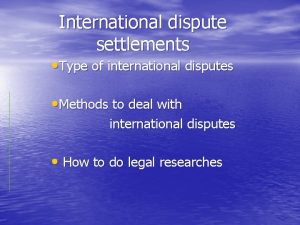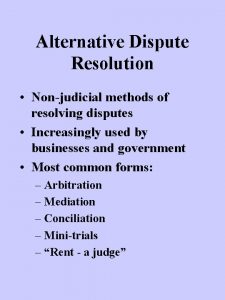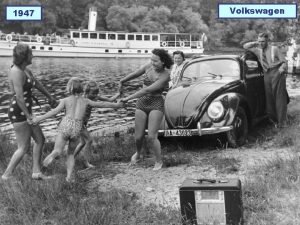CONCEPT OF INDUSTRIAL DISPUTES ACT 1947 Industrial dispute







![DEFINITIONS Appropriate Government [Sec. 2(a)]: Appropriate Government means the Central Government in relation to DEFINITIONS Appropriate Government [Sec. 2(a)]: Appropriate Government means the Central Government in relation to](https://slidetodoc.com/presentation_image_h/0d7d2dc4bad9e3860b73968328568e1d/image-8.jpg)
![DEFINITIONS Award [Sec 2 (b)] means an interim or a final determination of any DEFINITIONS Award [Sec 2 (b)] means an interim or a final determination of any](https://slidetodoc.com/presentation_image_h/0d7d2dc4bad9e3860b73968328568e1d/image-9.jpg)
![DEFINITIONS Industrial Dispute [Sec. 2(k)]: means any dispute or difference between employers and employers, DEFINITIONS Industrial Dispute [Sec. 2(k)]: means any dispute or difference between employers and employers,](https://slidetodoc.com/presentation_image_h/0d7d2dc4bad9e3860b73968328568e1d/image-10.jpg)
![DEFINITIONS Wages [Sec. 2(rr)]: Wages mean all remuneration capable of being expressed in terms DEFINITIONS Wages [Sec. 2(rr)]: Wages mean all remuneration capable of being expressed in terms](https://slidetodoc.com/presentation_image_h/0d7d2dc4bad9e3860b73968328568e1d/image-11.jpg)














![4. COURT OF ENQUIRY [Sec. 6]: as occasion arises, Government can initiate a Court 4. COURT OF ENQUIRY [Sec. 6]: as occasion arises, Government can initiate a Court](https://slidetodoc.com/presentation_image_h/0d7d2dc4bad9e3860b73968328568e1d/image-26.jpg)



![6. INDUSTRIAL TRIBUNAL [Sec. 7 A] Industrial Tribunal [Sec. 7 A]: The appropriate Government 6. INDUSTRIAL TRIBUNAL [Sec. 7 A] Industrial Tribunal [Sec. 7 A]: The appropriate Government](https://slidetodoc.com/presentation_image_h/0d7d2dc4bad9e3860b73968328568e1d/image-30.jpg)

![JURISDICTION OF INDUSTRIAL TRIBUNAL [SEC. 7 (A)(L)] The following matters are specified under the JURISDICTION OF INDUSTRIAL TRIBUNAL [SEC. 7 (A)(L)] The following matters are specified under the](https://slidetodoc.com/presentation_image_h/0d7d2dc4bad9e3860b73968328568e1d/image-32.jpg)
![JURISDICTION OF INDUSTRIAL TRIBUNAL [SEC. 7 (A)(L)] 7. Classification by grades. 8. Rules of JURISDICTION OF INDUSTRIAL TRIBUNAL [SEC. 7 (A)(L)] 7. Classification by grades. 8. Rules of](https://slidetodoc.com/presentation_image_h/0d7d2dc4bad9e3860b73968328568e1d/image-33.jpg)

![7. NATIONAL TRIBUNALS [SEC. 7 (B)] The Central Government may by notification in the 7. NATIONAL TRIBUNALS [SEC. 7 (B)] The Central Government may by notification in the](https://slidetodoc.com/presentation_image_h/0d7d2dc4bad9e3860b73968328568e1d/image-35.jpg)
![7. NATIONAL TRIBUNALS [SEC. 7 (B)] The duties of a National Tribunal are the 7. NATIONAL TRIBUNALS [SEC. 7 (B)] The duties of a National Tribunal are the](https://slidetodoc.com/presentation_image_h/0d7d2dc4bad9e3860b73968328568e1d/image-36.jpg)





![STRIKES AND LOCKOUTS Strike [Sec. 2 (q)]: Strike means "a cessation of work by STRIKES AND LOCKOUTS Strike [Sec. 2 (q)]: Strike means "a cessation of work by](https://slidetodoc.com/presentation_image_h/0d7d2dc4bad9e3860b73968328568e1d/image-42.jpg)
![LOCKOUTS [SEC. 2(1)] Lockout [Sec. 2(1)]: Lockout means "the temporary closing of a place LOCKOUTS [SEC. 2(1)] Lockout [Sec. 2(1)]: Lockout means "the temporary closing of a place](https://slidetodoc.com/presentation_image_h/0d7d2dc4bad9e3860b73968328568e1d/image-43.jpg)



![General prohibition of strikes and lock- outs [Section 23] General prohibition of strikes and General prohibition of strikes and lock- outs [Section 23] General prohibition of strikes and](https://slidetodoc.com/presentation_image_h/0d7d2dc4bad9e3860b73968328568e1d/image-47.jpg)
![General prohibition of strikes and lock- outs [Section 23] (bb) during the pendency of General prohibition of strikes and lock- outs [Section 23] (bb) during the pendency of](https://slidetodoc.com/presentation_image_h/0d7d2dc4bad9e3860b73968328568e1d/image-48.jpg)
![LEGAL STRIKES AND LOCKOUTS [SECTION 24 OF ID ACT 1947] strike or a lockout LEGAL STRIKES AND LOCKOUTS [SECTION 24 OF ID ACT 1947] strike or a lockout](https://slidetodoc.com/presentation_image_h/0d7d2dc4bad9e3860b73968328568e1d/image-49.jpg)
![LEGAL STRIKES AND LOCKOUTS [SECTION 24 OF ID ACT 1947] Section 23 General prohibition LEGAL STRIKES AND LOCKOUTS [SECTION 24 OF ID ACT 1947] Section 23 General prohibition](https://slidetodoc.com/presentation_image_h/0d7d2dc4bad9e3860b73968328568e1d/image-50.jpg)
![PENALTY FOR ILLEGAL STRIKES AND LOCK-OUTS. [SECTION 26] Penalty for illegal strikes and lock-outs. PENALTY FOR ILLEGAL STRIKES AND LOCK-OUTS. [SECTION 26] Penalty for illegal strikes and lock-outs.](https://slidetodoc.com/presentation_image_h/0d7d2dc4bad9e3860b73968328568e1d/image-51.jpg)





![WORKMEN NOT ENTITLED TO COMPENSATION IN CERTAIN CASES [SECTION 25 E] (i) if he WORKMEN NOT ENTITLED TO COMPENSATION IN CERTAIN CASES [SECTION 25 E] (i) if he](https://slidetodoc.com/presentation_image_h/0d7d2dc4bad9e3860b73968328568e1d/image-57.jpg)
![WORKMEN NOT ENTITLED TO COMPENSATION IN CERTAIN CASES [SECTION 25 E] (ii) if he WORKMEN NOT ENTITLED TO COMPENSATION IN CERTAIN CASES [SECTION 25 E] (ii) if he](https://slidetodoc.com/presentation_image_h/0d7d2dc4bad9e3860b73968328568e1d/image-58.jpg)
![RETRENCHMENT Section 2(oo)] "retrenchments" means the termination by the employer of the service of RETRENCHMENT Section 2(oo)] "retrenchments" means the termination by the employer of the service of](https://slidetodoc.com/presentation_image_h/0d7d2dc4bad9e3860b73968328568e1d/image-59.jpg)

![PROCEDURE FOR RETRENCHMENT [SECTION 25 G] Where any workman industrial establishment who is a PROCEDURE FOR RETRENCHMENT [SECTION 25 G] Where any workman industrial establishment who is a](https://slidetodoc.com/presentation_image_h/0d7d2dc4bad9e3860b73968328568e1d/image-61.jpg)

![SECTION 25 F [CONDITIONS PRECEDENT TO RETRENCHMENT OF WORKMEN] No workman employed in any SECTION 25 F [CONDITIONS PRECEDENT TO RETRENCHMENT OF WORKMEN] No workman employed in any](https://slidetodoc.com/presentation_image_h/0d7d2dc4bad9e3860b73968328568e1d/image-63.jpg)
![SECTION 25 F [CONDITIONS PRECEDENT TO RETRENCHMENT OF WORKMEN] (c) notice in the prescribed SECTION 25 F [CONDITIONS PRECEDENT TO RETRENCHMENT OF WORKMEN] (c) notice in the prescribed](https://slidetodoc.com/presentation_image_h/0d7d2dc4bad9e3860b73968328568e1d/image-64.jpg)
![PENALTY FOR LAY-OFF AND RETRENCHMENT [Sec. 5 Q ] This section applies to an PENALTY FOR LAY-OFF AND RETRENCHMENT [Sec. 5 Q ] This section applies to an](https://slidetodoc.com/presentation_image_h/0d7d2dc4bad9e3860b73968328568e1d/image-65.jpg)

- Slides: 66



CONCEPT OF INDUSTRIAL DISPUTES ACT 1947 Industrial dispute means any dispute of difference between employees and employers or between employers and workmen or between workmen and workmen, which is connected with the employment or non-employment of the terms of employment or the conditions of work of any person. A workman includes any person (including an apprentice) employed in an industry to do manual, unskilled, technical, operational, clerical or supervisory work for hire or reward.

OBJECT OF INDUSTRIAL DISPUTES ACT 1947 The object of the Industrial Disputes Act 1947 is to secure industrial peace and harmony by providing machinery and procedure for the investigation and settlement of industrial disputes by negotiations. The objective of the Industrial Disputes Act 1947 to deals with the retrenchment process of the employees, procedure for layoff, procedure and rules for strikes and lockouts of the company.

OBJECT OF INDUSTRIAL DISPUTES ACT 1947 The object of the Act is to promote collective bargaining and to maintain a peaceful atmosphere in industries by avoiding illegal strikes and lock outs. Its object is to protect the workmen against victimization by the employers and to ensure social justice to both employers and employees. The objective of the Industrial Disputes Act is to secure industrial peace and harmony by providing machinery and procedure for the investigation and settlement of industrial disputes by negations.

SCOPE OF INDUSTRIAL DISPUTES ACT 1947 This Act may be called the Industrial Disputes Act 1947. It extends to the whole of India.

APPLICATION OF INDUSTRIAL DISPUTES ACT 1947 It extends to all industries whether they are carried on by private owners or by the government.
![DEFINITIONS Appropriate Government Sec 2a Appropriate Government means the Central Government in relation to DEFINITIONS Appropriate Government [Sec. 2(a)]: Appropriate Government means the Central Government in relation to](https://slidetodoc.com/presentation_image_h/0d7d2dc4bad9e3860b73968328568e1d/image-8.jpg)
DEFINITIONS Appropriate Government [Sec. 2(a)]: Appropriate Government means the Central Government in relation to any industrial dispute concerning any industry carried on by or under the authority of the Central Government, any industry carried on by a Railway Company, any controlled industry specified by the Central Government, The Unit Trust of India. Corporations under the Central Statutes, Banking company, Insurance company. Mines. Oil field, Cantonment board, Major ports, etc. In relation to any other industrial dispute, the appropriate Government is the State Government.
![DEFINITIONS Award Sec 2 b means an interim or a final determination of any DEFINITIONS Award [Sec 2 (b)] means an interim or a final determination of any](https://slidetodoc.com/presentation_image_h/0d7d2dc4bad9e3860b73968328568e1d/image-9.jpg)
DEFINITIONS Award [Sec 2 (b)] means an interim or a final determination of any industrial dispute or of any question relating thereto by any Labour Court, Industrial Tribunal or National Industrial Tribunal and includes an arbitration award made under section 10 A. Industry [Sec. 2(j)]: Industry means any business, trade, undertaking, manufacture or calling of employers and includes any calling, service, employment, handicraft or industrial occupation or avocation of workmen.
![DEFINITIONS Industrial Dispute Sec 2k means any dispute or difference between employers and employers DEFINITIONS Industrial Dispute [Sec. 2(k)]: means any dispute or difference between employers and employers,](https://slidetodoc.com/presentation_image_h/0d7d2dc4bad9e3860b73968328568e1d/image-10.jpg)
DEFINITIONS Industrial Dispute [Sec. 2(k)]: means any dispute or difference between employers and employers, or between employers and workmen, or between workmen and workmen, which is connected with the employment or nonemployment or the terms of employment or with the conditions of labour, of any person. Settlement [Sec. 2(p)]: Settlement means a settlement arrived at in the course of conciliation proceeding and includes a written agreement between an employer and a workman arrived at otherwise than in the course of conciliation proceeding where such agreement has been signed by the parties thereto in such manner as may be prescribed.
![DEFINITIONS Wages Sec 2rr Wages mean all remuneration capable of being expressed in terms DEFINITIONS Wages [Sec. 2(rr)]: Wages mean all remuneration capable of being expressed in terms](https://slidetodoc.com/presentation_image_h/0d7d2dc4bad9e3860b73968328568e1d/image-11.jpg)
DEFINITIONS Wages [Sec. 2(rr)]: Wages mean all remuneration capable of being expressed in terms of money, which would, if the terms of employment, express or implied were fulfilled, be payable to a workman in respect of his employment or of the work done in such an employment and includes: (i) such allowances (including dearness allowance) (ii) the value of any house accommodation, or of supply of light, water, medical attendance or other amenity or of any. (iii) Any traveling concession.

DEFINITIONS 2(n) "Public utility service" means – (i) any railway service or any transport service for the carriage of passengers or goods by air; (ia) any service in, or in connection with the working of, any major port or dock; (ii) any section of an industrial establishment, on the working of which the safety of the establishment or the workmen employed therein depends; (iii) any postal, telegraph or telephone service;

DEFINITIONS 2(n) "Public utility service" (iv) any industry which supplies power, light or water to the public; (v) any system of public conservancy or sanitation; (vi) any industry specified in the First Schedule which the appropriate Government may, if satisfied that public emergency or public interest so requires, by notification in the Official Gazette, declare to be a public utility service for the purposes of this Act, for such period as may be specified in the notification.

AUTHORITIES FOR SETTLEMENT OF INDUSTRIAL DISPUTE The Industrial Disputes Act, 1947 provides an elaborate and efficient machinery for the peaceful and amicable settlement of the industrial disputes. They include: 1. Works Committees (Sec 3) 2. Conciliation Officers (Sec 4)

AUTHORITIES FOR SETTLEMENT OF INDUSTRIAL DISPUTE 3. Board of Conciliation (Sec 5) 4. Courts of Enquiry (Sec 6) 5. Labour Court (Sec 7) 6. Tribunals (Sec 7 A) 7. National Tribunals (Sec 7 B)

1. WORKS COMMITTEE (Sec. 3) In case of an industrial establishment in which on hundred or more workmen are employed or have been employed on any day in the preceding twelve months, the appropriate Government may be general or special order require the employer to constitute in the prescribed manner, a works committee consisting o f representatives of employers and workmen engaged in the establishment, so however that the number of representatives of workmen or the committee shall not be less than the number of representatives of the employers. The representatives o f the workmen engaged in the establishment and in the consultation with their trade union, if and registered under the Indian Trade Union Act, 1926

DUTIES OF THE WORKS COMMITTEE a) To promote measures for securing and preserving amity and good relations between the employer and workmen. b) To comment upon matters of their common interest or concern and c) To endeavour to compose any material difference of opinion in respect o f such matters.

2. CONCILIATION OFFICERS (Sec 4) The appropriate Government may appoint such number of persons as it thinks fit, to be conciliation officers, by notification in the Official Gazette. A conciliation officer may be appointed for a specified industries in a specified area or for one or more specified industries and either permanently or for a limited period.

DUTIES OF CONCILIATION OFFICERS 1. In every industrial dispute, existing or apprehended, the conciliation officer shall hold the conciliation proceedings in prescribed manner. 2. The conciliation officer for settling the dispute without delay shall investigate the dispute and may do all such things to make the parties to come fair and amicable settlement of dispute. 3. The conciliation officer shall send a report on the settlement o f the dispute to the appropriate Government together with a memorandum of the settlement signed by the parties to the dispute.

DUTIES OF CONCILIATION OFFICERS 4. If no such settlement is arrived at, the conciliation officer shall as soon as practicable after the close of the investigation, send to the appropriate Government a full report setting forth the steps taken by him for ascertaining the facts and circumstances relating to the dispute, and bringing about a settlement thereof together with a full statement. 5. If, on a consideration of the failure report referred above the appropriate Government is satisfied, that there is a case for reference to a Board, Labour Court, Tribunal or National Tribunal it make such reference.

DUTIES OF CONCILIATION OFFICERS 6. A report under Sec. 12 shall be submitted within 14 days of the commencement of the conciliation proceedings or within such shorter period as may be fixed by the appropriate Government. Provided that subject to the approval of the conciliation officer. The time for the submission of the report may be agreed upon in writing by all parties to the dispute. [Sec. 12(6)]

3. BOARD OF CONCILIATION (Sec 5) 3. BOARD OF CONCILIATION (SEC. 5) The appropriate Government may as the occasion arises by notification in the Official Gazette constitute a Board of conciliation for promoting the settlement of an industrial dispute. A Board shall consist of Chairman and two or four other members, as the appropriate Government thinks fit. The Chairman is an independent person and other members are representatives o f the parties to the dispute in equal numbers.

DUTIES OF BOARD OF CONCILIATION (Sec 13) 1. Where the dispute has been referred to a Board under this Act, it shall he the duty of the Board to endeavour to bring about at settlement of her same and for this purpose the Board shall, in such manner as it thinks fit and without delay, investigate the dispute and all matters affecting the merits and the right settlement[Sec. 13(1)]. 2. If a settlement of dispute or of any of the matters in dispute is arrived at in the course of the conciliation proceedings the Board shall send a report thereof to the appropriate Government together with a memorandum o f the settlement signed by the parties to the dispute. [Sec. 13(2)]

DUTIES OF BOARD OF CONCILIATION (Sec 13) 3. If no such settlement is arrived at, the Board shall as soon as practicable after the close o f investigation send to the appropriate Government a full report on the steps taken by the Board for ascertaining the facts and circumstances relating to the dispute and for bringing about a settlement thereof Report shall also contain a full statement o f such facts and circumstance and the reasons on account of which, in its opinion a settlement could not be arrived at. [Sec. 13(3)]

DUTIES OF BOARD OF CONCILIATION (Sec 13) 4. The board shall submit its report within 2 months of the date on which the dispute was referred to it or within such shorter period as may be fixed by the appropriate Government. [Sec. 13(5)]. Thus, where conciliation fails, board of conciliation takes over. The functions of the Board of Conciliation are the same as those of the conciliation officers. The purpose of constituting boards of Conciliation is to bring about settlement o f individual disputes.
![4 COURT OF ENQUIRY Sec 6 as occasion arises Government can initiate a Court 4. COURT OF ENQUIRY [Sec. 6]: as occasion arises, Government can initiate a Court](https://slidetodoc.com/presentation_image_h/0d7d2dc4bad9e3860b73968328568e1d/image-26.jpg)
4. COURT OF ENQUIRY [Sec. 6]: as occasion arises, Government can initiate a Court of Inquiry. This Court of Inquiry was to find out matters connected with or relevant to an industrial dispute. Where a Court consists of two or more members, one of them shall be appointed as the chairman. A Court of Inquiry looks into only matters which are referred to it by Government and submits report to the Government ordinarily within certain period from the date of reference.

DUTIES OF COURT OF ENQUIRY Duties of Court of Enquiry: A court shall enquire into the matters referred to it and report thereon to the appropriate Government ordinarily within a period of 6 months from the commencement of its enquiry.

5. LABOUR COURT (SEC. 7) The appropriate Government may, by notification in the Official Gazette constitute one or more Labour Courts for the adjudication of industrial disputes relating to any matter specified in the second schedule and for performing such other fictions as may be assigned to them under this Act. A Labour Court shall consist of one person only to be appointed by the appropriate Government.

DUTIES OF LABOUR COURT The Labour Court shall hold its proceedings expeditiously and shall as soon as practicable on the conclusion thereof submit its award to the appropriate Government. (Sec. 15)
![6 INDUSTRIAL TRIBUNAL Sec 7 A Industrial Tribunal Sec 7 A The appropriate Government 6. INDUSTRIAL TRIBUNAL [Sec. 7 A] Industrial Tribunal [Sec. 7 A]: The appropriate Government](https://slidetodoc.com/presentation_image_h/0d7d2dc4bad9e3860b73968328568e1d/image-30.jpg)
6. INDUSTRIAL TRIBUNAL [Sec. 7 A] Industrial Tribunal [Sec. 7 A]: The appropriate Government may, by notification in the Official Gazette, constitute one or more Industrial Tribunals for the adjudication of industrial disputes relating to any matter, whether specified in the Second Schedule or the Third Schedule and for performing such other functions as may be assigned to them under this Act. A Tribunal consists of one person only.

APPOINTMENT AS THE PRESIDING OFFICER OF A TRIBUNAL For appointment as the presiding officer of a Tribunal he is, or has been, a Judge of a High Court; or he has, for a period of not less than 3 years, been a District Judge or an Additional District Judge; he is or has been a Deputy Chief Labour Commissioner (Central) or Joint Commissioner of the State Labour Department, having a degree in law and at 7 seven years’ experience in the labour department after having acquired degree in law including three years of experience as Conciliation Officer:
![JURISDICTION OF INDUSTRIAL TRIBUNAL SEC 7 AL The following matters are specified under the JURISDICTION OF INDUSTRIAL TRIBUNAL [SEC. 7 (A)(L)] The following matters are specified under the](https://slidetodoc.com/presentation_image_h/0d7d2dc4bad9e3860b73968328568e1d/image-32.jpg)
JURISDICTION OF INDUSTRIAL TRIBUNAL [SEC. 7 (A)(L)] The following matters are specified under the Third schedule: 1. Wages, including the period and mode of payment. 2. Compensatory and other allowances. 3. Hours of work and rest intervals. 4. Leave with wages and holidays. 5. Bonus, Profit sharing. Provident Fund and gratuity. 6. Shift working otherwise than in accordance with standing orders.
![JURISDICTION OF INDUSTRIAL TRIBUNAL SEC 7 AL 7 Classification by grades 8 Rules of JURISDICTION OF INDUSTRIAL TRIBUNAL [SEC. 7 (A)(L)] 7. Classification by grades. 8. Rules of](https://slidetodoc.com/presentation_image_h/0d7d2dc4bad9e3860b73968328568e1d/image-33.jpg)
JURISDICTION OF INDUSTRIAL TRIBUNAL [SEC. 7 (A)(L)] 7. Classification by grades. 8. Rules of discipline. 9. Nationalization. 10. Retrenchment of workmen and closure of establishment, and 11. Any other matter that may be prescribed

DUTIES OF A PRESIDING OFFICER OF A TRIBUNAL The duties of a tribunal shall hold its proceedings expeditiously and shall as soon as practicable on the conclusion thereof submit its award to the appropriate Government.
![7 NATIONAL TRIBUNALS SEC 7 B The Central Government may by notification in the 7. NATIONAL TRIBUNALS [SEC. 7 (B)] The Central Government may by notification in the](https://slidetodoc.com/presentation_image_h/0d7d2dc4bad9e3860b73968328568e1d/image-35.jpg)
7. NATIONAL TRIBUNALS [SEC. 7 (B)] The Central Government may by notification in the Official Gazette, constitute one or more National Tribunals for the adjudication of industrial disputes which in the opinion of the Central Government, involve questions of national importance or are of such a nature that industrial establishments situated in more than one state are likely to be interested in, or affected by such disputes. A national tribunal shall consist o f one person only to be appointed by the Central Government.
![7 NATIONAL TRIBUNALS SEC 7 B The duties of a National Tribunal are the 7. NATIONAL TRIBUNALS [SEC. 7 (B)] The duties of a National Tribunal are the](https://slidetodoc.com/presentation_image_h/0d7d2dc4bad9e3860b73968328568e1d/image-36.jpg)
7. NATIONAL TRIBUNALS [SEC. 7 (B)] The duties of a National Tribunal are the same as those of as Labour Court or an Industrial Tribunal. [Sec. 7 B (2)] A Person shall not be qualified for appointment as the presiding officer of a National Tribunal unless he is or has been a judge of a High Court. [Sec. 7 B (3)] The Central Government may, if it thinks fit, appoint 2 persons as assessors to advise the National Tribunal in the proceeding before it [Sec. 7 B(4)].

DUTIES OF NATIONAL TRIBUNAL Where an industrial dispute has been referred to a Labour Court, Tribunal or National Tribunal for adjudication, it shall hold its proceedings expeditiously and shall within the period specified in the order referring such industrial dispute or the flirter period 107 extended under the second provision to subsection (2 -A) of section 10 submit its award to the appropriate Government (Sec. 15).

8. GRIEVANCE SETTLEMENT AUTHORITY (Sec. 9 (c) The employer in relation to every industrial establishment in which fifty or more workmen are employed or have been employed on any day in the preceding twelve months, shall provide for in accordance with the rules made in that behalf under this Act, a Grievance Settlement Authority for the settlement of industrial

8. GRIEVANCE SETTLEMENT AUTHORITY (Sec. 9 (c) Where an industrial dispute connected with an individual workman arises in an establishment referred to in sub- section (1), a workman or any trade union of workmen of which such workman is a member, refer, in such manner as may be prescribed such dispute to the Grievance Settlement Authority provided for by the employer under that sub- section for settlement.

9. ARBITRATORS [sec. 10 (a) An arbitrator is appointed by the Government. Whether the dispute is before Labour Court, or Industrial Tribunal or National Tribunal, the parties can go to arbitration by written agreement. The arbitrators conduct the investigation in to the dispute matters and give arbitration award (final decision or settlement or decree) as for making reference of an industrial dispute. If an industrial dispute exists or is apprehended and the employer and the workman agree to refer the dispute to an arbitration, they may refer the dispute to an arbitration.

9. ARBITRRATORS [sec. 10 (a) But such reference shall be made before the dispute has been referred under Sec. 19 to a Labour Court or Tribunal or National Tribunal by a written agreement. The arbitrator may be appointed singly or more than one in number. The arbitrator or arbitrators shall investigate the dispute and submit to the appropriate Government the arbitration award signed by the arbitrator or all the arbitrators, as the case may be.
![STRIKES AND LOCKOUTS Strike Sec 2 q Strike means a cessation of work by STRIKES AND LOCKOUTS Strike [Sec. 2 (q)]: Strike means "a cessation of work by](https://slidetodoc.com/presentation_image_h/0d7d2dc4bad9e3860b73968328568e1d/image-42.jpg)
STRIKES AND LOCKOUTS Strike [Sec. 2 (q)]: Strike means "a cessation of work by a body of persons employed in any industry acting in combination or a concerted refusal under a common understanding of any number of persons who are or have been so employed, to continue to work or to accept employment". Mere stoppage of work does not come within the meaning of strike unless it can be shown that such stoppage of work was a concerted action for the enforcement of an industrial demand.
![LOCKOUTS SEC 21 Lockout Sec 21 Lockout means the temporary closing of a place LOCKOUTS [SEC. 2(1)] Lockout [Sec. 2(1)]: Lockout means "the temporary closing of a place](https://slidetodoc.com/presentation_image_h/0d7d2dc4bad9e3860b73968328568e1d/image-43.jpg)
LOCKOUTS [SEC. 2(1)] Lockout [Sec. 2(1)]: Lockout means "the temporary closing of a place of employment, or the suspension of work, or the refusal by an employer to continue to employ any number of persons employed by him". Lockout is the antithesis of strike.

PROCEDURE OF STRIKES According to Sec. 22(1) No person employed in a public utility service shall go on strike in breach of contract(a) without giving to the employer notice of strike, as hereinafter provided, within six weeks before striking; or (b) within fourteen days of giving such notice; or (c) before the expiry of the date of strike specified in any such notice as aforesaid; or (d) during the pendency of any conciliation proceedings before a conciliation officer and seven days after the conclusion of such proceedings.

PROCEDURE OF LOCKOUTS According to Sec. 22(2) No person employed in a public utility service shall go on Lockout in breach of contract(a) without giving to the employer notice of Lockout, as hereinafter provided, within six weeks before lockout; or (b) within fourteen days of giving such notice; or (c) before the expiry of the date of lockout specified in any such notice as aforesaid; or (d) during the pendency of any conciliation proceedings before a conciliation officer and seven days after the conclusion of such proceedings.

NOTICE OF LOCK-OUT OR STRIKE Notice of lock-out or strike According to Sec. 22 (3) the notice of lockout or strike under this section shall not be necessary where there is already in existence a strike or, as the case may be, lock-out in the public utility service.
![General prohibition of strikes and lock outs Section 23 General prohibition of strikes and General prohibition of strikes and lock- outs [Section 23] General prohibition of strikes and](https://slidetodoc.com/presentation_image_h/0d7d2dc4bad9e3860b73968328568e1d/image-47.jpg)
General prohibition of strikes and lock- outs [Section 23] General prohibition of strikes and lock- outs. - No workman who is employed in any industrial establishment shall go on strike in breach of contract and no employer of any such workman shall declare a lock- out- (a) during the pendency of conciliation proceedings before a Board and seven days after the conclusion of such proceedings; (b) during the pendency of proceedings before a Labour Court, Tribunal or National Tribunal] and two months after the conclusion of such proceedings;
![General prohibition of strikes and lock outs Section 23 bb during the pendency of General prohibition of strikes and lock- outs [Section 23] (bb) during the pendency of](https://slidetodoc.com/presentation_image_h/0d7d2dc4bad9e3860b73968328568e1d/image-48.jpg)
General prohibition of strikes and lock- outs [Section 23] (bb) during the pendency of arbitration proceedings before an arbitrator and two months after the conclusion of such proceedings, where a notification has been issued under sub- section (3 A) of section 10 A; or] [10 A. Voluntary reference of disputes to arbitration] (c) during any period in which a settlement or award is in operation, in respect of any of the matters covered by the settlement or award.
![LEGAL STRIKES AND LOCKOUTS SECTION 24 OF ID ACT 1947 strike or a lockout LEGAL STRIKES AND LOCKOUTS [SECTION 24 OF ID ACT 1947] strike or a lockout](https://slidetodoc.com/presentation_image_h/0d7d2dc4bad9e3860b73968328568e1d/image-49.jpg)
LEGAL STRIKES AND LOCKOUTS [SECTION 24 OF ID ACT 1947] strike or a lockout shall be illegal, if employers or worker who ever disobeys or fails to follow [Sec 22, 23, 10(3), 10 -A (4 -A)] for commencing strikes or lockout, those strikes and lockout are said to illegal. Section 22 Prohibition of strikes and Lockouts (Notice is mandatory in public utility services)
![LEGAL STRIKES AND LOCKOUTS SECTION 24 OF ID ACT 1947 Section 23 General prohibition LEGAL STRIKES AND LOCKOUTS [SECTION 24 OF ID ACT 1947] Section 23 General prohibition](https://slidetodoc.com/presentation_image_h/0d7d2dc4bad9e3860b73968328568e1d/image-50.jpg)
LEGAL STRIKES AND LOCKOUTS [SECTION 24 OF ID ACT 1947] Section 23 General prohibition of strikes and Lockouts (if said matter is pending before board, a Labour Court, Tribunal or national tribunal or arbitrator as mention under Sec 10 & 10 A or settlement or about is in operation) Section 10 Reference of disputes to Boards, courts or Tribunals Section 10 A Voluntary reference of disputes to arbitration
![PENALTY FOR ILLEGAL STRIKES AND LOCKOUTS SECTION 26 Penalty for illegal strikes and lockouts PENALTY FOR ILLEGAL STRIKES AND LOCK-OUTS. [SECTION 26] Penalty for illegal strikes and lock-outs.](https://slidetodoc.com/presentation_image_h/0d7d2dc4bad9e3860b73968328568e1d/image-51.jpg)
PENALTY FOR ILLEGAL STRIKES AND LOCK-OUTS. [SECTION 26] Penalty for illegal strikes and lock-outs. - (1) Any workman who commences, continues or otherwise acts in furtherance of, a strike which is illegal under this Act, shall be punishable with imprisonment for a term which may extend to one month, or with fine which may extend to fifty rupees, or with both. Any employer who commences, continues, or otherwise acts in furtherance of a lock-out which is illegal under this Act, shall be punishable with imprisonment for a term which may extend to one month, or with fine which may extend to one thousand rupees, or with both.

LAY-OFF AND RETRENCHMENT The term ‘lay-off’ has been defined as the failure, refusal or inability of an employer on account of the shortage of coal, power or raw materials or the accumulation of stocks or the breakdown of machinery or natural calamity or for any other unconnected reason to give employment to a workman whose name is borne on the muster rolls of his industrial establishment and who has not been retrenched. Essentially, a lay-off is a condition where the employers are constrained to deny work to their workforce owing to conditions that bring forth a temporary inability to keep their business going. The said case scenario can happen only in a continuing establishment.

ESSENTIAL CONDITIONS FOR LAYOFF Right of Compensation by workmen lay-off Workman name should be borne on muster rolls of the establishment and he/she is not a badli workman or a casual workman; and The workman should have completed not less than one year continuous service as defined under Section 25 -B; and The workman should have lay-off, continuously or intermittently;

ESSENTIAL CONDITIONS FOR LAYOFF Then the workman shall be entitled to lay-off compensation for all days during which he was so laid-off; However, the workman shall not be paid lay-off compensation for such weekly holidays as may intervene the period of lay-off. The lay-off compensation is equal to 50% of the total of the basic wages and dearness allowance that would have been payable to him, if he had not been so laid off.

MAXIMUM DAYS ALLOWED TO LAYOFF According to section 25 C of Industry and dispute Act 1947, maximum days allowed to Layoff of employee by employer is 45 days, for those days, employee who is lay-off is entitled for compensation equal to 50% of the total of the basic wages and dearness allowance that would have been payable to him, had he not been so lay off. if this contingency is prolonging beyond a reasonable time, say 45 days, it would be matter of serious concern. both to the employer and to the workmen because both of them

MAXIMUM DAYS ALLOWED TO LAYOFF are put to a loss of 50% wages i. e. The employer is required pay lay-off compensation without extracting work from workmen and workmen too, would be losing 50% wages which he would have earned had he not been so laid-off. Therefore the parties can enter into an agreement not to continue lay-off after a period of 45 days in a year.
![WORKMEN NOT ENTITLED TO COMPENSATION IN CERTAIN CASES SECTION 25 E i if he WORKMEN NOT ENTITLED TO COMPENSATION IN CERTAIN CASES [SECTION 25 E] (i) if he](https://slidetodoc.com/presentation_image_h/0d7d2dc4bad9e3860b73968328568e1d/image-57.jpg)
WORKMEN NOT ENTITLED TO COMPENSATION IN CERTAIN CASES [SECTION 25 E] (i) if he refuses to accept any alternative employment in the same establishment from which he has been lay off, or in any other establishment belonging to the same employer situate in the same town or village or situate within a radius of five miles from the establishment to which he belongs. For any special skill or previous experience and can be done by the workman, provided that the wages which would normally have been paid to the workman are offered for the alternative employment also;
![WORKMEN NOT ENTITLED TO COMPENSATION IN CERTAIN CASES SECTION 25 E ii if he WORKMEN NOT ENTITLED TO COMPENSATION IN CERTAIN CASES [SECTION 25 E] (ii) if he](https://slidetodoc.com/presentation_image_h/0d7d2dc4bad9e3860b73968328568e1d/image-58.jpg)
WORKMEN NOT ENTITLED TO COMPENSATION IN CERTAIN CASES [SECTION 25 E] (ii) if he does not present himself for work at the establishment at the appointed time during normal working hours at least once a day; (iii) if such laying-off is due to a strike or slowingdown of production on the part of workmen in another part of the establishment.
![RETRENCHMENT Section 2oo retrenchments means the termination by the employer of the service of RETRENCHMENT Section 2(oo)] "retrenchments" means the termination by the employer of the service of](https://slidetodoc.com/presentation_image_h/0d7d2dc4bad9e3860b73968328568e1d/image-59.jpg)
RETRENCHMENT Section 2(oo)] "retrenchments" means the termination by the employer of the service of a workman for any reason whatsoever, otherwise than as a punishment inflicted by way of disciplinary action but does not include(a) voluntary retirement of the workman; or (b) retirement of the workman on reaching the age of superannuation if the contract of employment between the employer and the workman concerned contains a stipulation in that behalf; or

RETRENCHMENT 43[(bb) termination of the service of the workman as a result of the non-renewal of the contract of employment between the employer and the workman concerned on its expiry or of such contract being terminated under a stipulation on that behalf contained therein; or] (c) termination of the service of a workman on the ground of continued ill-health;
![PROCEDURE FOR RETRENCHMENT SECTION 25 G Where any workman industrial establishment who is a PROCEDURE FOR RETRENCHMENT [SECTION 25 G] Where any workman industrial establishment who is a](https://slidetodoc.com/presentation_image_h/0d7d2dc4bad9e3860b73968328568e1d/image-61.jpg)
PROCEDURE FOR RETRENCHMENT [SECTION 25 G] Where any workman industrial establishment who is a citizen of India, is to be retrenched and he belongs to a particular category of workmen in that establishment, In the absence of any agreement between the employer and the workman in this behalf, the employer shall ordinarily retrench the workman who was the last person to be employed in that category, unless for reasons to be recorded the employer retrenches any other workman

CONDITIONS OF RETRENCHMENT To an industrial establishment (not being an establishment of a seasonal character or in which work is performed only intermittently) in which not less than [50 but not more than 100] workmen were employed on an, average per working day for the preceding twelve months. [Section 25 A]
![SECTION 25 F CONDITIONS PRECEDENT TO RETRENCHMENT OF WORKMEN No workman employed in any SECTION 25 F [CONDITIONS PRECEDENT TO RETRENCHMENT OF WORKMEN] No workman employed in any](https://slidetodoc.com/presentation_image_h/0d7d2dc4bad9e3860b73968328568e1d/image-63.jpg)
SECTION 25 F [CONDITIONS PRECEDENT TO RETRENCHMENT OF WORKMEN] No workman employed in any industry who has been in continuous service for not less than one year under an employer shall be retrenched by that employer until- (a) the workman has been given one month’s notice in writing indicating the reasons for retrenchment and the period of notice has expired, or the workman has been paid in lieu of such notice, wages for the period of the notice; (b) the workman has been paid, at the time of retrenchment, compensation which shall be equivalent to fifteen days’ average pay [for every completed year of continuous service] or any part thereof in excess of six months; and
![SECTION 25 F CONDITIONS PRECEDENT TO RETRENCHMENT OF WORKMEN c notice in the prescribed SECTION 25 F [CONDITIONS PRECEDENT TO RETRENCHMENT OF WORKMEN] (c) notice in the prescribed](https://slidetodoc.com/presentation_image_h/0d7d2dc4bad9e3860b73968328568e1d/image-64.jpg)
SECTION 25 F [CONDITIONS PRECEDENT TO RETRENCHMENT OF WORKMEN] (c) notice in the prescribed manner is served on the appropriate government [for such authority as may be specified by the appropriate government by notification in the Official Gazette]. To an industrial establishment (not being an establishment of a seasonal character or in which work is performed only intermittently) in which not less than [one hundred] workmen were employed on an, average per working day for the preceding twelve months. [Section 25 K]
![PENALTY FOR LAYOFF AND RETRENCHMENT Sec 5 Q This section applies to an PENALTY FOR LAY-OFF AND RETRENCHMENT [Sec. 5 Q ] This section applies to an](https://slidetodoc.com/presentation_image_h/0d7d2dc4bad9e3860b73968328568e1d/image-65.jpg)
PENALTY FOR LAY-OFF AND RETRENCHMENT [Sec. 5 Q ] This section applies to an industrial establishment (not being an establishment of a seasonal character or in which work is performed only intermittently) in which not less than [one hundred] workmen were employed on an, average per working day for the preceding twelve months. [Section 25 K] Compulsory permission from competent authority by employer to lay off of Workmen [Section 25 M] Section 25 N [Conditions precedent to retrenchment of workmen]

 What is labour law
What is labour law Objectives of industrial dispute act 1947
Objectives of industrial dispute act 1947 Objectives of industrial dispute act 1947
Objectives of industrial dispute act 1947 Anatomy of industrial disputes
Anatomy of industrial disputes Presidential succession act of 1947 definition
Presidential succession act of 1947 definition Presidential succession act of 1947 definition
Presidential succession act of 1947 definition Prorupted state ap human geography
Prorupted state ap human geography Nicholas spykman rimland theory
Nicholas spykman rimland theory Antecedent boundary example
Antecedent boundary example Why might fishing disputes arise in the region?
Why might fishing disputes arise in the region? Chapter 4 settling disputes
Chapter 4 settling disputes Consumer disputes redressal agencies
Consumer disputes redressal agencies Consumer disputes redressal agencies
Consumer disputes redressal agencies Change order disputes
Change order disputes Krishna godavari dispute
Krishna godavari dispute Msc construction law
Msc construction law Wto dispute settlement mechanism
Wto dispute settlement mechanism Dispute settlement mechanism meaning
Dispute settlement mechanism meaning Right dispute
Right dispute Maine canada border dispute
Maine canada border dispute Unit 1 dispute solving in civil law
Unit 1 dispute solving in civil law Uces dispute letters
Uces dispute letters Morphology ap human geography
Morphology ap human geography Csa basic thresholds
Csa basic thresholds Dispute management ai
Dispute management ai Delay and dispute mitigation
Delay and dispute mitigation Receivables management sap
Receivables management sap Credit management in o2c
Credit management in o2c Act 1 act 2 act 3
Act 1 act 2 act 3 Cold war 1947
Cold war 1947 La maxima tension 1947 y 1953
La maxima tension 1947 y 1953 Kodeks norymberski gdzie obowiązuje
Kodeks norymberski gdzie obowiązuje Constitutional development in pakistan from 1947 to 1973
Constitutional development in pakistan from 1947 to 1973 Father of social psychology
Father of social psychology Dasar cheeseman
Dasar cheeseman Kodeks norymberski 1947
Kodeks norymberski 1947 1991-1947
1991-1947 Roman feliksa saltna
Roman feliksa saltna Avtor bambija felix
Avtor bambija felix Revolt of 1857 to 1947
Revolt of 1857 to 1947 Eesti lauljatarid
Eesti lauljatarid Pengertian perang dingin
Pengertian perang dingin Sutherland 1947
Sutherland 1947 Grace kelly 1947
Grace kelly 1947 The porch, no. 2 (1947) by philip guston
The porch, no. 2 (1947) by philip guston Iso 1947
Iso 1947 How did nicholas novikov describe the united states
How did nicholas novikov describe the united states 9/21/1947
9/21/1947 First educational conference 1947
First educational conference 1947 2005-1947
2005-1947 Edwin sutherlands theory
Edwin sutherlands theory Menjelaskan organisasi profesi humas
Menjelaskan organisasi profesi humas 3 mars 1947
3 mars 1947 Nürnbergi kódex 1947
Nürnbergi kódex 1947 Real vs ideal self psychology
Real vs ideal self psychology Pengertian pemasaran
Pengertian pemasaran Industrial sickness meaning
Industrial sickness meaning National industrial recovery act of 1933
National industrial recovery act of 1933 Othello act 1 scene 3 summary
Othello act 1 scene 3 summary Consequent passion example
Consequent passion example Macbeth act 4 scene 4 summary
Macbeth act 4 scene 4 summary Imperfect voluntariness
Imperfect voluntariness Republic act no. 9344 is otherwise known as: *
Republic act no. 9344 is otherwise known as: * Title act vs practice act
Title act vs practice act What is an act 120 certification?
What is an act 120 certification? S a t c quadrants
S a t c quadrants Act 6 act 5
Act 6 act 5

